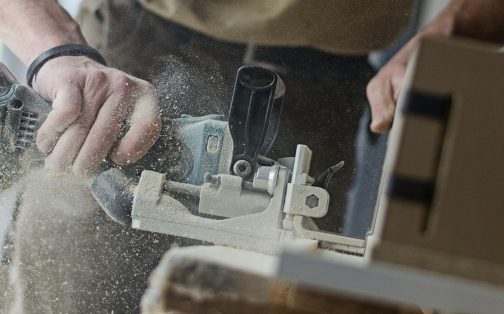
- Home
- Accidents at Work
- Understanding the Process of Claiming Compensation for an Accident at Work: Your Complete Guide

Understanding the Process of Claiming Compensation for an Accident at Work: Your Complete Guide
If you've been injured after an incident in your workplace, you may be considering claiming compensation for an accident at work.
This can help as you recover from the injuries sustained. But you may have questions about the process, your eligibility to make a claim, and how it all works.
In 2023/24, 61,663 non-fatal injuries were reported to the authorities under RIDDOR (Reporting of Injuries, Diseases, and Dangerous Occurrences Regulations), with 124 workers being killed as a result of work-related accidents in 2024/25.
These statistics show you are not alone and claiming compensation for an accident at work may be something to consider as you seek support and guidance post-accident.
We've compiled a list of frequently asked questions to help with your decision-making:
Overview of Workplace Injuries – Common Workplace Hazards
A workplace injury can have a devastating impact on the person affected by the accident. Affecting their health, affecting their financial situation if unable to work, the effects can be far reaching.
Injuries can happen as a result of many different circumstances:
- Defective equipment resulting in an accident occurring
- A fall from a height
- A slip on an untreated / neglected surface
- Inappropriate protective clothing leading to injury
Common workplace hazards, if the accident wasn’t your fault and resulted in injury on the business’s premises or while conducting work duties, then you could be eligible to make a workplace injury claim.
These claims focus on the attempt to recover compensation from an at-fault party – your employer – following an accident at work.
The compensation will help with rehabilitation, and any adjustments required should your life be altered by the injuries sustained.
The claim may be against your employer, but the compensation will be paid by the employer’s liability insurance.
Can I claim compensation for an accident at work?
When considering whether you can make a work accident claim, the nature of the accident must be considered.
If you believe you can prove that another party was at fault for the accident and you suffered injury as a result, then you could be eligible to make a claim.
It’s important to have the necessary evidence to support your claim; without that, the employer may contest liability, and there is a chance of an unsuccessful outcome. The more evidence you have, the stronger your case.
It’s also important to check your eligibility to make a claim before pressing ahead. For example, if the accident occurred more than three years ago, you’d be unable to make a claim as the time limit, imposed by law, only allows for claims to be started within three years of the accident date (there are certain exceptions to this).
Types of injuries covered
Slips, trips, and falls are common workplace hazards that can leave an employee injured, as well as injuries from handling or lifting heavy objects.
Depending on the nature of the workplace, there can be burns or more specific injuries based on the type of potentially hazardous work taking place.
Broken bones, cuts, head injuries, the list of workplace injuries following an accident is a lengthy one.
If you’ve suffered an accident at work and believe someone else was at fault, give our expert team a callback request to discuss your circumstances.
Health and safety at work
Regardless, your employer should have conducted diligent risk assessments, as well as delivering regular checks on equipment that is used on site to mitigate potential accidents.
This is part of their health and safety at work awareness as part of their commitment to creating a workplace environment that is safe for all employees.
This is expected, by law, as part of the Health and Safety at Work Act 1974. It sets out duties which:
- Employers have towards employees and members of the public
- Employees have to themselves and each other
Ensuring the safety and wellbeing of staff, businesses must pay due diligence to this area of their organisation.
Employer responsibilities
With a duty of care for their staff, employers should do their best to identify and mitigate the possibility of a workplace injury happening. This requirement is shown in several ways: risk assessments of the workplace environment, regular inspection of work equipment, training for staff, and providing appropriate equipment to allow employees to do their job safely. All of these contribute to the measures that a company should be taking to ensure workers can conduct their duties safely.
Winns were professional and thorough, they ensured I received the best treatment for my injuries and I can’t recommend the physio they provided enough! Amazing service and the compensation paid out for my injury was appropriate and fair.
Denise
What is employer liability insurance?
This is an indemnity that covers a business in relation to accidents which they may be liable for.
When circumstances result in the injury of someone on their premises, and the liability rests with them, they then may be ordered to pay compensation to help the injured party during their recovery or adjustment to a new normal.
The company itself won’t pay this directly, but the insurance provider of their employer liability insurance will provide the funds instead.
Steps to claiming compensation for an accident at work
If you’re looking to make an office accident claim, it is best to discuss the circumstances of the accident you’ve had and the injuries sustained with a legal professional. By contacting the team at Winns, you can have a no-obligation chat and be told if you have an eligible claim for compensation.
They’ll talk you through the process and begin pulling together the relevant evidence and information required to support a claim against your employer. The more evidence you can provide, the better your case’s chances.
While you're off work, your employer should carry out an investigation into what happened, as well as the cause of your accident. This will help them to identify any shortcomings and see where they can make improvements to prevent further accidents. This can include implementing new training and safety checks, as well as purchasing new equipment.
Once the evidence is obtained, your legal representatives will negotiate with the third-party insurers to get the compensation you deserve. Should the negotiations fail to find a mutually agreeable outcome, the need to go to court will arise.
This is a rare occurrence, and most of the time, claims are settled before this point.
Reporting the incident
The first thing you need to do if you are considering making a work injury compensation claim is to inform your employer of the incident ASAP, making sure that they note it in an accident log. If this is not done, then make a record of the accident yourself. A record of the incident can be vital to the success of the case, and you can find further information on what to do if an accident log does not exist on the Citizens Advice website.
The next step should be to see a doctor for an examination. Even if your injuries seem minor, a doctor's assessment will help you to get relevant treatment while also providing a record of your injuries.
Gathering evidence
When it comes to submitting a claim, your chances of success will be boosted if you have as many of the evidential matters on our accident at work compensation checklist as possible.
It’s not essential to have them all, but the more evidence you collate, the stronger your claim will be:
- Make sure your company has recorded the accident
- Produce a written version of events from your perspective
- Can CCTV be obtained?
- Take photos of the scene of the accident
- Get the details of anyone who witnessed the accident.
These are just some of the evidential points that could help your claim. Don’t worry if you don’t have all of them, your file handler will be able to assist.
If you think you might be eligible to make an employer’s liability claim, request a call back from our team today.
Working with accident injury lawyers
There are plenty of accident at work solicitors that can cater for accident at work claims. When deciding which one to pick, look at their review ratings and feedback from clients on platforms like Trustpilot. This will support you in finding those accident at work solicitors, like Winns, who have genuinely helped their customers with outstanding service from start to finish consistently and repeatedly.
Workers’ compensation benefits
It is the responsibility of your employer to make sure that you are kept safe during your time at work by providing the right equipment and training, as well as creating an environment where you can expect not to come to harm. If they fail in that undertaking, then you, as an employee, have certain rights should you be injured at work:
- The right to make a claim
- The right to be compensated for your injuries and employer's negligence
- The right to pursue a claim without being treated detrimentally
- The right to sick pay
Each of these points is covered within our Accidents at Work page, but if you have any questions then please contact the team at Winns.
The service I received was exceptional. From keeping me updated every step of the process to explaining everything in detail.
Sandra
Duration and amount of compensation
The time it takes to settle a claim can vary from case to case and be dependent on liability arguments, the nature of the accident, and the severity and complexity of the injuries sustained by the affected party.
The settlement entitlement for work injury compensation claims varies with every case. Several factors have to be taken into account, such as the severity of the injuries, time away from work, and loss of earnings, to name a few. To get a better idea of how much compensation you may be due, speak to a member of Winn's expert team today.
Can I be sacked for having an accident at work?
If you're worried about making a claim following an accident at work, then you can rest easy. It's illegal for an employer to dismiss you following a claim for work injury compensation under UK employment law.
If they do, or you suspect that they have let you go as a result of a claim being brought, then you have the right to make a legal claim for unfair dismissal.
Common questions about workplace injury claims
What are the time limits for filing a claim?
In England and Wales, there is a very clear window for making a claim following an accident at work. In most cases, if you do not commence court proceedings within three years of the incident that caused your injuries, then your claim may be considered 'time-barred' and will probably leave you ineligible for compensation. However, there is often a lot of work required before this can be done, so we would always advise you to contact Winns as soon as possible after the incident, to allow us to begin work on your behalf.
Do I still get paid if injured at work?
The amount that you will be paid if injured at work depends on the contract you have with your employer. Some companies offer an occupational sickness scheme, with the exact amount of pay you will be entitled to during your recuperation being outlined in your contract. If this scheme isn't in place, then you will still be entitled to Statutory Sick Pay (SSP). Under SSP, you will receive £94.25 per week before tax for up to 28 weeks, so long as you have been unable to work for at least four days in a row.
Can I claim on a no win, no fee basis?
With Winns, every accident at work compensation claim is carried out on a no win, no fee basis, so you don't have to worry about extra expense upfront. If your case is successful, any costs that have been incurred are recovered from the other side (normally paid from the same employer's liability insurance as your work injury compensation), and we would deduct a success fee from your compensation, as set out in the funding agreement. If for any reason your case is unsuccessful, then you still won’t have to pay a penny, as long as you have followed the terms of our funding agreement.
Request a Callback
Had an accident that wasn’t your fault? Leave your details and we’ll call you back.
Thank you
Thank you for your request, one of our team members will be in touch shortly.
Find Out MoreExisting Client?
Keep on top of your claim 24/7, 365 days a year with Touchpoint, accessible from any internet-enabled device.



